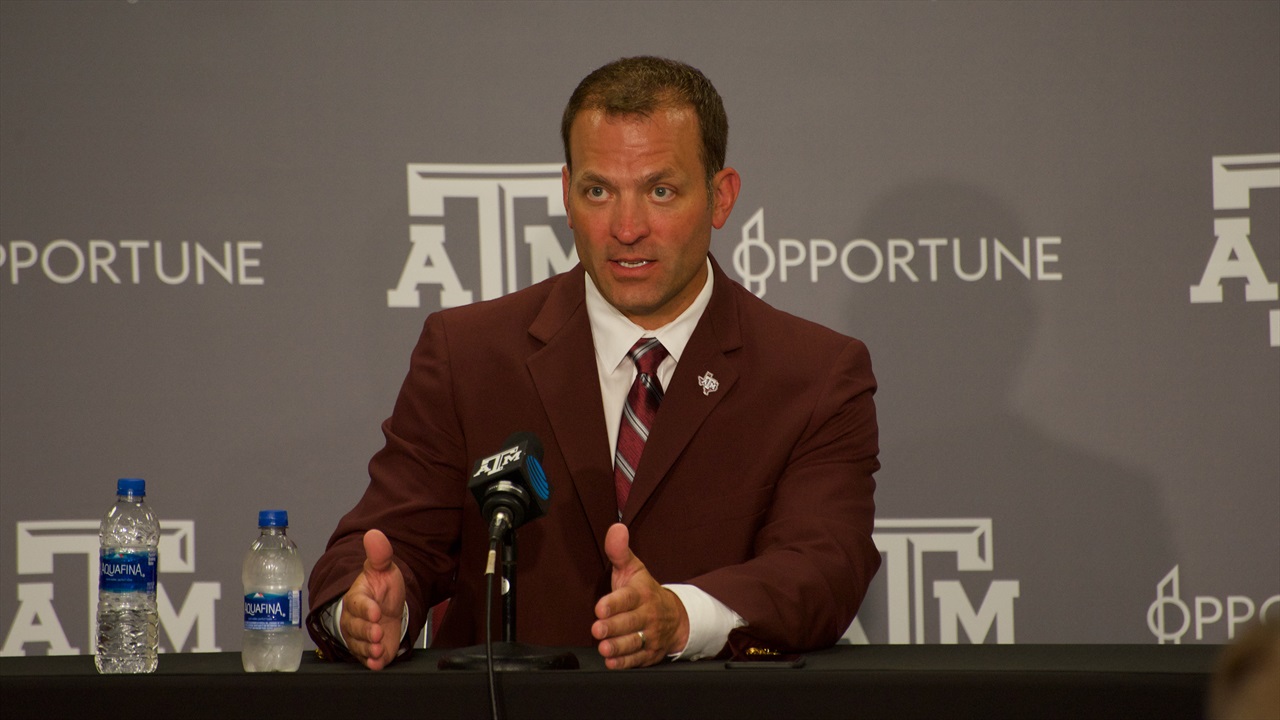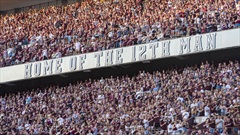
Bjork sounds hopeful tone for 2020 season as nation eyes recovery measures
NOTE: Video of Ross Bjork’s teleconference was provided to TexAgs by Texas A&M’s athletic department.
With a list of concerns growing like the beard on his face, Texas A&M Athletic Director Ross Bjork remained relatively optimistic for the upcoming football season.
The coronavirus pandemic — which has now been blamed for over 176,000 deaths worldwide and almost 45,000 in the United States — has threatened the 2020 college football season.
Additionally, the oil crash — which brought prices to historic lows — has damaged the Texas economy and figures to decrease donations to A&M’s athletic department substantially.
Still, the usually clean-shaven Bjork, now sporting a full beard, appeared bullish on the 2020 football season, whether it be delayed, played without fans, excluding some parts of the country or any other issues that might arise.
"Each day that goes by, we have some certainty,” Bjork said. “We have some clarity, which gives us optimism that we’re reaching maybe the peak of all of this, whether it's locally or regionally or as a country.
“So, I think with each passing day, if we get more good news, (coronavirus) testing becomes more available, we can start to look at what it might operate under in terms of how we return to activity, play games, go to school and all those things. Definitely optimistic for sure.”
New York Governor Andrew Cuomo has said the number of fatalities in New York City, the epicenter of the pandemic in the U.S., “appears to be slowing.”
Meanwhile, Florida, Georgia, South Carolina and Texas have lifted some of the quarantine measures that were instated in March.
Also, return to work protests have arisen in North Carolina, Kentucky and Michigan.
However, there is no firm date for when a decision on the 2020 season must be made or who will make that decision. President Donald Trump has said governors will decide when their states will begin re-opening.
But any progress toward re-opening is at least a small indication that the 2020 season will take place. A&M is scheduled to kick off the 2020 season on September 5 against Abilene Christian at Kyle Field.
“We see Georgia move forward with some reopening. We saw what’s happening our state,” Bjork said. “It’s going to vary. There’s not on single source at this point and time that’s going to say, ‘On this date, everyone returns.’
“We still have time. It’s way too early to make absolutes on anything at this point and time.”
Bjork made it clear he wants NCAA teams to play a full 12-game schedule in full stadiums but said he’d be open to the idea of playing games without fans if that is absolutely necessary and players agree.

“Would we play without fans? Of course,” he said. “If that’s what the players want to do and we could make it safe. We would operate that way. But that’s not ideal. That’s not what the experience is all about, mainly for our players but also for the communities that we live in.”
There is also a question of whether the season could proceed without some regions of the country participating.
Los Angeles Mayor Eric Garcetti said no concerts or sporting events would be allowed in his city until the spring of 2021.
Would a college football season be played without UCLA and USC or perhaps the entire Pac-12 participating?
“We know what the mayor of Los Angeles has talked about,” Bjork said. “That would impact USC and UCLA. I believe Alabama plays USC to open the season. What if Alabama is ready and USC is not? What happens there? I think all those different scenarios you have to look at.
"That’s where you really hope the conference commissioners really come together at the Power Five level, but also the FBS level, that there is some uniformity on how we return to activity and how we return to play.”
A&M, which has one of the largest athletic budgets in the nation, would need to play a full schedule with fans, especially because of the steep decline in the price of oil, which fell below zero on Monday. Several of A&M’s prominent donors and hundreds of season-ticket holders are in the oil business or at least affected by it.
“I don’t know how you get the price of a commodity below zero. I don’t know enough about the economics of that to fully understand it,” Bjork said. “But obviously, it has an impact. We get it. That’s why we’ve been in constant dialogue with donors and season ticket holders. We want to be as flexible with them as possible, whatever that impact might be.
“That’s obviously devastating news on our economy. We need to understand that and be ready to react whenever that may be.”
Bjork acknowledged revenue would decrease, which will create a need to cut expenses. He did not say what those cuts might be.
Coaches at Syracuse, Missouri, Oregon State and Washington State, among other programs, have taken voluntary pay cuts. Bjork said he has not asked A&M coaches — like football coach Jimbo Fisher, who earns $7.5 million annually — to take cuts. He indicated that could be a possibility, but seemed to suggest it was unlikely.
“We’ve looked at different models in terms of cost-cutting revenue,” Bjork said. “That would be one of them. We haven’t approached anybody. We haven’t looked at that specifically. It would be on the list of things.
"You don’t want to impact your people. I don’t really care how much they make. The first thing you want to do is protect your people. That’s what we would look to do.”
Some colleges have considered cutting some sports teams from their athletic programs. Bjork said A&M has not considered that.
“We have not put that on the table,” he said. “We do not anticipate putting that on the table.”

